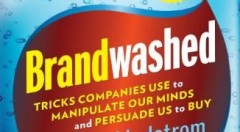Is Your Brand Evil?


Though Lindstrom’s arguments are persuasive, I think there’s a counterbalancing effect that’s just as important: brands ADD value to products.
Why Generics Failed

The more important factor, in my opinion, was that most buyers wouldn’t trust a product without a name on the package. Who is standing behind the quality of the product? How do I know this is the same cereal I bought last week, or, if I like it, will buy next week? If nobody wants to put their name on this stuff, what’s wrong with it? Stores vouched for the quality of their generic products, but soon realized that if they were going to add value in that way they might as well build their own brand. To the consumer, any brand – even one they never heard of – is better than no brand at all.
The Joy of Brand
There’s little doubt that brands affect us emotionally. Soda in a Coke can tastes better than when it’s in a Pepsi can, regardless of which cola the consumer is tasting. Wine thought to be more expensive tastes better than the same wine at a lower price. People are more creative when they are exposed to the Apple logo. More expensive drugs relieve pain better.
And, on the flip side, research from Taiwan shows that generic products reduce our self-esteem. Even brand lookalikes aren’t good enough; one study showed that people who thought they were wearing fake Chloé sunglasses were more dishonest than ones wearing authentic ones. (All were real Chloé.)
Let’s not belabor the point – it’s clear that brands really do work on our brain and change our perception of reality. But, is that a good thing or a bad thing? If a brand makes you feel better, have you been manipulated (or “brandwashed,” to use Lindstrom’s term? Or instead of worrying about that question, should we focus on building even more brands that make people feel better? Got an opinion? Click one choice in the poll below, and feel free to add your thoughts in a comment.

